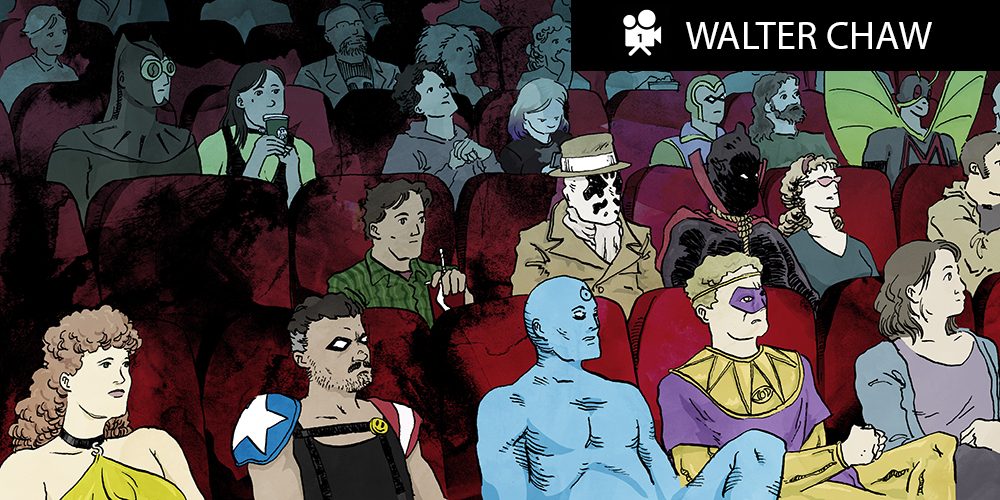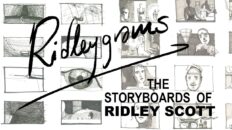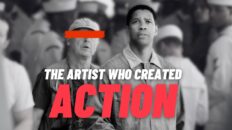Illustration by Seth T. Hahne
One of the things that frustrates me the most about being a cinephile is the tension I have always felt between the film critics I have read who have helped me process stories onscreen and the audiences—the people I interact with every day—who often seem to feel like “the critics” don’t understand them. I don’t always agree with even the film critics I most revere. But I have found, being privileged enough to interact with a few of them, more to relate to than disagree with. And I think getting to know them a little better might help bridge that gap. Here is our first installment of an ongoing series where we talk to film critics: Who Watches the Watchmen? Hopefully, we get to know them a little better, and engage with them as human beings—just like the rest of us—who have put their minds to work wrestling with the stories we watch over and over.The guiding light for Rise Up Daily is our slogan, a “Geek News Site With A DIY , Punk Style Ethos.” I can’t think of a better individual to kick off this series than Walter Chaw, who has made somewhat of a name for himself as a contrarian, but also paved his own way sharing his writing as the senior critic for Film Freak Central without a salary. He’s often controversial, but also introspective. And his body of work has grown to become a substantial, relevant voice.
RUD: First, of all, thank you for agreeing to let us ask you a few questions. For those who might not be familiar with you, can you tell us a little bit about what you do both at Alamo Drafthouse Denver and at Film Freak Central?
Chaw: You’re very welcome—thanks for asking! I’m the Vice President of Operations for the Alamo Drafthouse Cinema in Denver, CO. Right now, we have two theaters in the Denver area—looking to break ground here in the next few months on number three.
RUD: Congratulations!
Chaw: Thank you. I’m also the senior critic and contributing editor to Film Freak Central. I started writing for them full time in 2000. Bill Chambers is the founder of the site and has been my editor from the start. I don’t like writing for anyone else. He’s the best.
RUD: Recently I was reading about the Russian poet Joseph Brodsky who was put on trial for “social parasitism” essentially for thinking and writing instead of so-called productive work. During the trial he asserted that he believed his writing would be of use for those living and generations to come. And then there were scoffs from the audience. As I was reading that I started thinking about writers and journalists here in America in our present socio-political circumstances, but then film critics specifically. Do you think there’s an arrogance in writing film reviews and criticism? What drives you to write, and why should anyone bother reading what you have to say?
Chaw: I dunno… I can only really speak for myself. I’m not driven by arrogance in the pejorative sense. It’s solipsistic for me, for the most part—some would say onanistic—in that when I write film criticism it’s an attempt to understand who I am. I read once that Pauline Kael was asked why she’d never written an autobiography and she, pointing at her body of film criticism, said that she had. If you do it right, you always learn more about the critic than the work. The art is objective, right? It’s the reactions that are subjective. When I introduce films or lead discussions, I like to talk about how although we’re only showing one movie, every single person in the audience has seen a different one.
I also can’t speak to why anyone should read my work. I’m a little surprised whenever I learn that anyone has, frankly. I write because I have to. It’s almost a physical imperative. I’ve written poetry and fiction, but criticism (literary, music, and film) is where I excavate these ideas about how art, as inevitably the product of a human hand, has the ability to speak to something shared in our experience. When you read John Keats’s letters, they’re as recognizable and immediate as if they’d been written yesterday. There’s something magical about that—hopeful, essentially human, eternal even. I wrote about Charlie Kaufman’s work that way once, I think, in that I don’t always understand Kaufman’s films but they always seem to understand me. Unpacking great art—or even not-great art, is a means through which I try to unravel who I am in and out of a social context.
If the bigger question is whether what I do is important, I don’t think that’s for me to judge. It’s at least meaningful to me to engage in it.
RUD: A fair amount of your reviews, at least the ones I’ve read, seem to come across harsh–or maybe curmudgeonly. But then there are pieces like your review of Annihilation that are so personal and empathetic and touching and raw. Do you see yourself as having a style or maybe a theme that runs through your work?
Chaw: I don’t. I try to be true to what the work inspires in me. I have a label of being a flamethrower or curmudgeon that I think comes from me not really having masters to answer to when I piss off a studio or talent. Maybe I’m just an asshole. The simplest explanations are the most likely explanations, yes?
For what it’s worth, I don’t feel like a curmudgeon, but I do have a hard time with equivocation. I wrote a not kind review of Episode II back in the day and was notified that LucasFilm had taken us off their press-approved list. We stopped getting any kind of screener or media releases from them. I think if I was writing for anyone other than Bill, I would’ve been disciplined or fired – more likely, the review never would’ve seen the light of day.
I’ve learned a lot, though. At some point I realized that the reviews I was writing occasionally hurt the artists. I never used to presume that, but I do think about it now.
It’s an interesting question, though, about themes in my work. I think there must inevitably be some, but I’m too close to it to say.
RUD: As a follow up, in a way to both the last two questions, who do you write for? Do you have any specific audience in mind when you write?
Chaw: I write for me. It’s a selfish thing.
RUD: It feels to me that around almost every major Hollywood release right now there is a cacophony of issues that get caught up in talking about the film. From political to social to religious to economic. And these discussions can get really intense. On the one hand, I think sometimes all these discussions distract from the content of what’s on screen. On the other hand, I think part of the purpose of film, like all art, is to spur discussions like these and help us talk through how we navigate our lives. Do you have an approach to this dynamic?
Chaw: I don’t engage. I used to answer the mail, but I’m done with that. I try to stay out of comments sections (we killed ours at Film Freak Central a while ago), and though I have a social media presence, I tend to block anyone who comes into my mentions wanting to start a fight. I think that art, as you say, is always a reflection of proximate and ultimate indicators in our culture and even our biology. I’m a big student of cultural anthropology—I think that film is as powerful and influential as it is because it replicates the essential way that we evolved to learn. A tribe gathered in a dark cave before a flickering light to hear a story about who we are, are want to be, are had been. They’re warnings, love stories, instructional and titillating. They bring us together. They rend us apart.
My engagement is the writing. If I haven’t said what I need to say in it, I haven’t done it well and I’ll try to do better next time.
RUD: In your list of the top 50 films of 2017, you put an interesting choice at the top, Thelma by Norwegian director Joachim Trier. I don’t think I saw anyone else mention it in their top films of the year lists, but I had just seen it before reading your list. It’s a gorgeously shot slow burn thriller and pulled me in more than I expected. You wrote that “it’s frightening, but it’s hopeful” and I wonder what your thoughts are on the power of stories to give hope. Is it just a momentary feeling or do think stories have the power to make real change in people’s lives?
Chaw: I do. I think that stories are the only things that ever provide structure and hope in anyone’s lives. We’re creatures composed of stories. We tell stories about our lives, our memories, our dreams. We tell them about each other. We use them to contextualize who we are and where we belong. We choose these storylines sometimes and sometimes they choose us. Mental illness, and I’m really only equipped to talk about depression, is a pre-programmed storyline that you’re engaged in. It takes real effort to break out of your story, and real courage to tell a different one for yourself.
Religions are stories—Jung’s archetypes are based on old Greek religions, after all. The key to everything is understanding archetype and binding them, somehow, to the biology of our evolved consciousness. I’m starting to sound like Carlos Castaneda. Anyway, short answer, yes, stories have the power to make real change in people’s lives. Writing about them is, for me, just another story: the story of me watching this story and the things it taught me about who I am and what I believe.
RUD: What’s the one film, not necessarily your favorite, but that given the chance to share with someone you care about for their first viewing, would you recommend?
Chaw: I think it’s easier to answer what my favorite movie is: Francis Coppola’s The Conversation. I have a 14yr old daughter and an 11yr-old son. My son’s not that interested in movies—he likes video games, manga, ornithology, camping. My daughter, though, she’s seen all of Hitchcock’s American films, some in a classroom setting. She’s curious as hell about film though I suspect a lot of it right now is her wanting to spend time with me. I took her, though, this year to see Aguirre: The Wrath of God on 35mm and The Long Goodbye, also on 35mm. We saw Jaws that way a couple of years ago—Vertigo as well. I think that some of it’s a little complex for her, but I wanted her first experience with these titles to be “optimal” as it were. Each time she revisits these films for the rest of her life will be informed at least in part by these first times. I’m pleased about that.
RUD: Are there any current film critics you make time to read? And what do you think makes them worth reading?
Chaw: Honestly, none consistently. I have friends in the business that I’ll check in on now and again, and there are particular films that I know particular critics will have interesting perspectives on, but I don’t read a lot of modern film criticism. There are a lot of very talented people writing right now, though. I learned a lot from Emily Yoshida’s essay on the live-action Ghost in the Shell for instance, and Anjelica Bastien’s Detroit.
I do love reading book-length studies or collections of essays on a certain topic. I collect books on film. They fill rooms in my house.
I will say, and this is nothing unusual, that I used to read Ebert’s annual yearbooks cover-to-cover. I still have the Movie Home Companions from 1988-1995 on my shelf.








